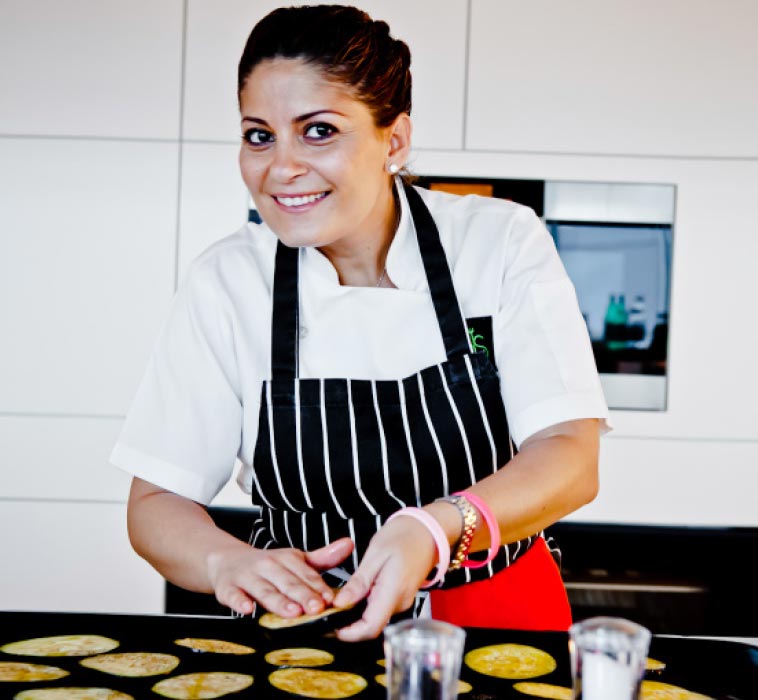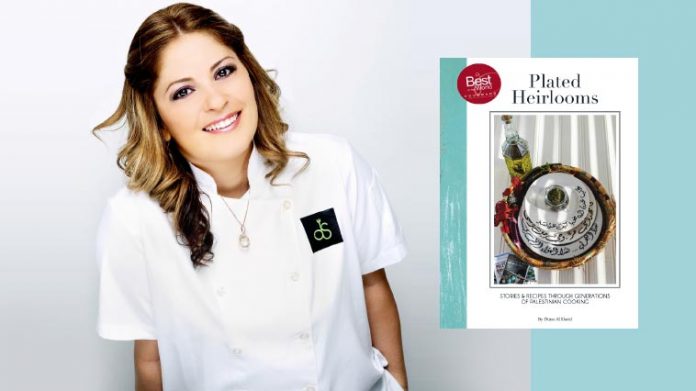How did you first become involved in the culinary world?
I was never a cook in my early adult life. I was always an eater though. I loved good food, quality food and savoured all food experiences I could get. I was very career oriented, and didn’t cook because I felt it was for home-makers who didn’t wish to work. Therefore, despite the many times my mum asked to teach me cooking, I always refused and felt it was “not for me”. It wasn’t until I had my first child that my mother gave me her whole collection of recipes – photocopied and some even handwritten. Months later, I took a look at those recipes and lost myself to four hours of reading! Only to realise that in those four hours I had experienced all types of emotions simply reading ingredients such as chopped onions, a cup of rice, a tablespoon of sugar, a handful of flour. Because those lines I read held in them so many memories from my childhood, and aromas of my parents’ home and foods I had with my grandmothers. By reading those recipes I connected with many events from my life and was reminded of aromas from my home. That was a life-changing moment, because I realised then that food was way more than the mere cooking, the ingredients and techniques that create various dishes. I realised that food was a connection. It connects us to our roots, our lives and our heritage.
You’ve become known for organic produce and working with organic farmers. Why did you decide to take this route? Is it flavour, ethics or a bit of both?
Both really. First of all, organic farming produces a way-superior quality. Organic farming, as we all know, is the healthiest type of farming, which means we do not risk our health when eating organic produce, as we do not ingest chemical cocktails that are proven harmful and cancerous to our bodies. Most importantly, though, is that organic farming cares for the environment, this earth that we live on and tend to take for granted. This is mainly why I choose organic produce, and support the organic farmers that work very hard to make this produce available for us. You know, it’s not exactly the easiest type of farming, nor is it the least risky.
Your book, Plated Heirlooms, has been well received and recognised with an international award. What was the inspiration for the book? Do you have a Palestinian background yourself?
Yes it has. I am so proud of my Plated Heirlooms. In fact it won three international awards apart from the ‘Best In The World’ title at the Gourmand World Cookbook Awards. It also won best cookbook in the UAE at the BBC Good Food Awards.
 So, yes, it has done well. However, to me all the awards are small in the face of the feedback I receive from readers. I just love how people received this book. Don’t forget it is a big – 500-page – book, which is not exactly the first choice for most readers. However, I have not once faced a challenge with promoting it. People love it, when they see it, they just love it. Then when they read it, they can’t get enough. I get messages from readers who bought it a while back who still get in touch and say they still go back to read it. That makes me so happy. I love how they really consider it a complete resource for Palestinian cuisine and cooking. How they tell me all the time that their cooking had tremendously improved ever since they started cooking my recipes and how everyone around them tells them that. What more can any one book do, really? People have connected with the story, with the food, with the information, and many felt reconnected and nostalgic… I really wanted that, for once, the real Palestinian persona would shine through and be seen despite all the fog caused by today’s circumstances.
So, yes, it has done well. However, to me all the awards are small in the face of the feedback I receive from readers. I just love how people received this book. Don’t forget it is a big – 500-page – book, which is not exactly the first choice for most readers. However, I have not once faced a challenge with promoting it. People love it, when they see it, they just love it. Then when they read it, they can’t get enough. I get messages from readers who bought it a while back who still get in touch and say they still go back to read it. That makes me so happy. I love how they really consider it a complete resource for Palestinian cuisine and cooking. How they tell me all the time that their cooking had tremendously improved ever since they started cooking my recipes and how everyone around them tells them that. What more can any one book do, really? People have connected with the story, with the food, with the information, and many felt reconnected and nostalgic… I really wanted that, for once, the real Palestinian persona would shine through and be seen despite all the fog caused by today’s circumstances.


































